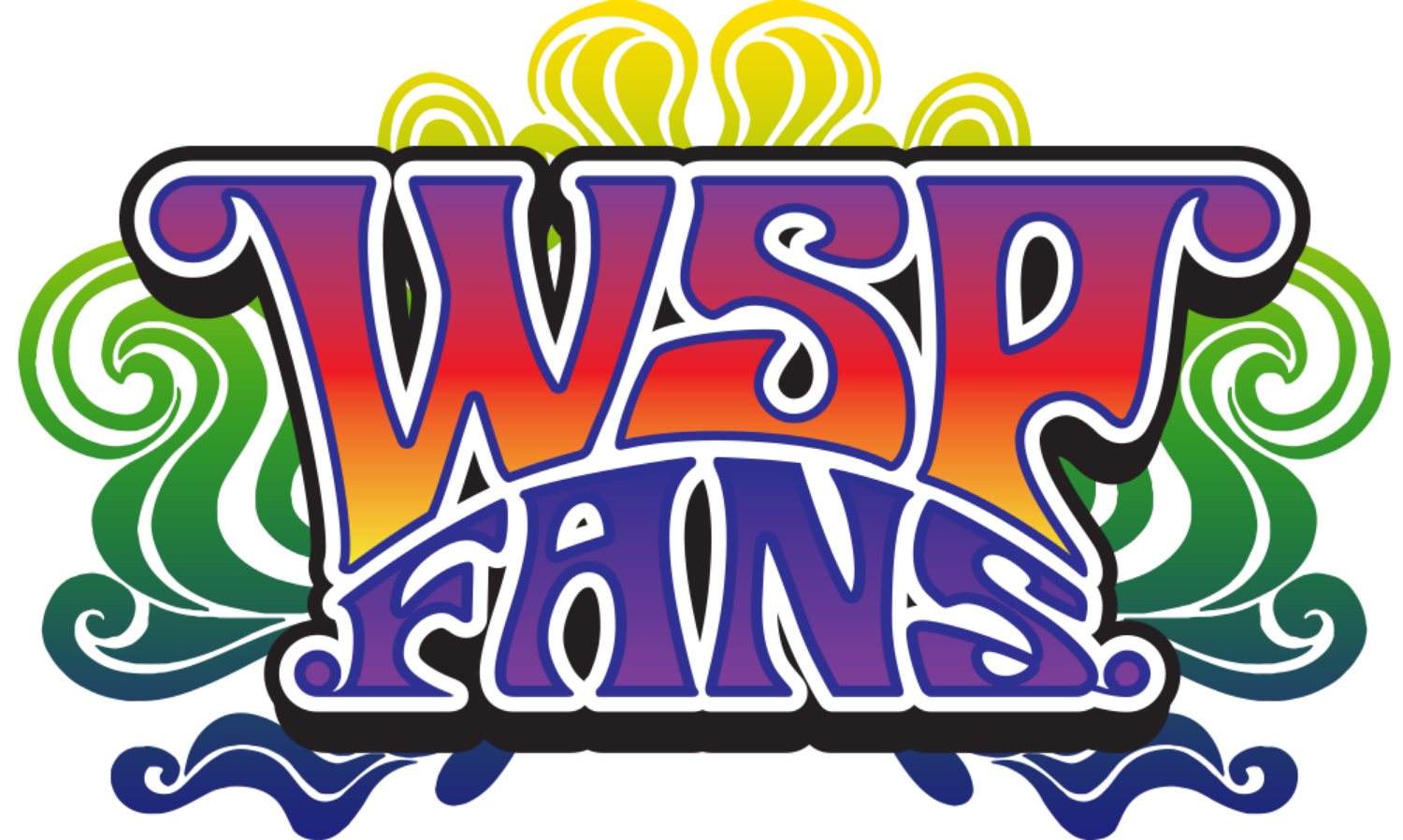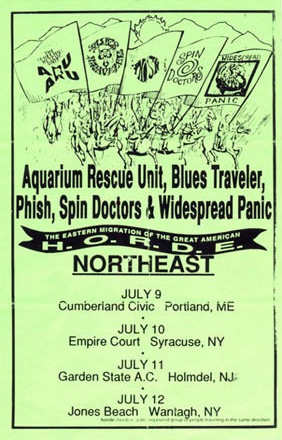Phish meets Widespread Panic: The collaborative powerhouse of H.O.R.D.E. tour 1992

By Pete Mason founder of Phanart
In 1992, John Popper’s vision for an East Coast version of Lollapalooza took off, bringing together a collection of bands that are now iconic for their role as Jambands in the early 90s. Spin Doctors, Widespread Panic, Phish, Aquarium Rescue Unit and Bela Fleck & the Flecktones took to the road for a series of July and August dates that generated a growing, interlaced following for all the bands on this tour. These up and coming acts, the ones that were just on the cusp of making it big were part of the initial H.O.R.D.E. tour – Horizons of Rock Developing Everywhere, part of John Popper’s vision that brought together fans from all walks of life and created a large, diverse community of people and music, bonding through improvisation.
Of these bands, two didn’t just make it big, they made it huge. Phish and Widespread Panic have similar roots and have taken somewhat similar paths in their careers, both spanning 25 years of on and off the road touring. Phish got their start in the college town of Burlington, Vermont, via University of Vermont and Goddard College, playing small bars and branching out into New England, then New York and Colorado before spreading out across the nation during the summers of 1990 and 1991, leading to a nationwide fanbase. Widespread Panic hails from Athens, Georgia, home to University of Georgia where they played the bars and clubs on and off Broad Street before spreading throughout the south, playing fraternity parties and small venues in Dixie, meeting fellow traveling musicians and gaining a following of fervent fans. The two bands are popular in their own parts of the country – Phish finds it’s base in the northeast while Panic has the south; the opposite is not as true, leading to smaller tours in the other’s homebase. Both find immense success out west, with Widespread holding a record for shows at Red Rocks, a venue Phish stopped playing in 1996 due to ‘outside circumstances.’
Tour Poster from H.O.R.D.E.
But of course Phish and Widespread Panic had a small history before H.O.R.D.E. Thanks to the go-between that is Col. Bruce Hampton, a small contract of sorts with Phish led to the bands meeting each other (a fly on the wall moment for a fan of both bands, like myself). In 1990, the two bands brought the other in to perform as the opening act in their own respective necks of the woods, spreading out the name of their bands and music for those living far from the locales where the bands may normally play. Think of 1990, when Panic was playing in New York, opening for Phish – who would know that these two acts rival each other only in size of their following, headlining the biggest rock festival in America (Bonnaroo) and playing multi-night runs at venues across the county? Indeed, 1990 was the start of something big that would come to its first peak in 1992 when the two acts, with many others, took to the stages around the country and brought a traveling festival with what would prove to be the next wave of Jambands and influence musicians and bands for the next two decades. This is not to mention that in 1990, Page McConnell, keyboardist for Phish played organ for the studio version of Holden Oversoul, which later appeared on the reissue of Space Wrangler, in 1992. With a break from tour down south, Page went the next step and sat-in with Panic in the studio, something rarely repeated in the years following H.O.R.D.E. – an encore version of Low Spark of High Heeled Boys with Trey and Page proves to be the most these bands have sat in with each other over the years.
Trey and Sunny, creating their own random jam during H.O.R.D.E
H.O.R.D.E. however, proved to be the changing point for both bands, in that their effort to grow an audience had landed on the mother lode – a traveling festival, of sorts. There was no camping but there may as well have been with a lineup like this, a pre-festival lineup before festivals returned to prominence a few years later, due in part to Phish’s Clifford Ball and Maine festivals. In 1993 and 1994, the bands were playing their biggest crowds yet, bigger rooms, amphitheaters even, selling out shows – and this was before the Grateful Dead retired from the road in August of 1995. The stage was set at H.O.R.D.E.; thanks to this festival, conceived by Popper and carried to fruition by the bands and staff of the fest, these two bands, Widespread Panic and Phish were both able to springboard into the spotlight of the 1990s and 21st century, creating a fanbase that rivals even that of the Grateful Dead, for neither band is fading away. Both have hit their struggles due to exhaustion, addiction and illness but have come up stronger in the end as a result. This does not happen to those mainstream bands that rise fast and flutter out when the fanbase is turned off from a bad album or poorly planned live concert. No, Phish and Widespread Panic, two bands that rose to the occasion of H.O.R.D.E. are two of the biggest bands in America, year in and year out, thanks to fans that are drawn not only for the music, but also for the community. The lots had a festival vibe, but with early music the vibe was brought inside, creating an eager and anticipatory audience for the entire gamut of bands, hungry to hear music and absorb it in. This was part of Popper’s dream behind H.O.R.D.E., to increase the audience for all bands and lead to success that was not left for just one headliner but rather all acts on the bill. It could be argued that the nascent of this community started about the same time (both are similar in many ways, different only in personal tastes beyond music) and then spread back to their respective corners of the country to foment and grow on their own terms. John Popper and his H.O.R.D.E. festival tour was critical in creating the fanbase for all these acts, most notably the dedicated following that Phish and Widespread Panic can continue to count on throughout their tours and breaks going into the distant future.
Never before have the north and south of this country been so intertwined than with the music of these two bands. With thanks to Col. Bruce Hampton and John Popper, long live Phish and long live Widespread Panic.






